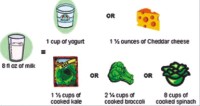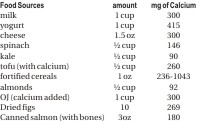|
Health
Why is Calcium Important?
 Calcium is the most abundant mineral in the body. Its most prominent function is the growth and maintenance of healthy bones and teeth. Calcium is also important for muscle and nerve control, blood clotting and blood pressure control. Adequate calcium may also assist with weight loss, alleviate PMS symptoms and help prevent colon cancer. Calcium is the most abundant mineral in the body. Its most prominent function is the growth and maintenance of healthy bones and teeth. Calcium is also important for muscle and nerve control, blood clotting and blood pressure control. Adequate calcium may also assist with weight loss, alleviate PMS symptoms and help prevent colon cancer.
Osteoporosis
Osteoporosis is a disease in which the bones become brittle and may break. It is often called the silent disease because there are no overt signs of it until a bone is fractured. Eating a diet rich in calcium through all stages of life and participating in regular, weight-bearing exercises are essential in the prevention of osteoporosis.
 How much Calcium do I need How much Calcium do I need
According to the National Institute of Health, teens and young adults, whose bones are growing rapidly, require around 1,300 mg per day. The recommendation slightly drops to 1,000mg between ages 19 and 50 and increases to 1200-1500 mg over the age of 50.
Sources of Calcium
Milk and dairy products are primary sources of calcium. There are, however, a variety of other foods like dark green leafy vegetables and foods with added calcium that can be eaten to achieve your needs. The key is to incorporating a wide variety of foods with calcium in your diet, which can help ensure you get the calcium you need each day. Calcium supplements are also readily available and often recommended.
Ways to increase your calcium intake
* Drink fat-free or low-fat milk as beverages at mealtimes
* milk for water in oatmeal and hot cereals
* fat-free or low-fat yogurt as a snack or dessert
* calcium-fortified juices, soy beverages or cereals
* leafy greens such as collard, turnip and greens
The amount of bone you build during teen and young adult years is called peak bone mass. This is the strongest your bones will ever be, and that is why getting enough calcium while you are growing is so important. After your early 20's, you do not build bone mass, so the goal is keep your bones healthy the remainder of your life by doing a few simple things:
* Eat enough calcium from low fat sources, or supplement
* Strengthen your bones through regular exercise
* Avoid unhealthy, low calorie diet plans
* If you are a post-menopausal woman, discuss estrogen replacement with your doctor
* Avoid smoking, and if you do smoke, quit!
People who constantly diet throughout their lives are at greater risk for osteoporosis because they often do not get enough calcium (or other nutrients) because of low calorie intake. So, maintaining healthy bones is another good reason to lose weight the right way: through a balanced, low fat diet plan and regular physical activity.
 Calcium is the number one mineral in the body. There is more of it than any other mineral. Most of the body's stored supply is found in the bones and teeth. Calcium is the number one mineral in the body. There is more of it than any other mineral. Most of the body's stored supply is found in the bones and teeth.
Calcium is known for its role in helping to support bone strength and the regulation of heartbeat.
Calcium supplements are one of the most well-known mineral supplements used for the support of women's health issues. Many women take it primarily for osteoporosis, pregnancy or high blood pressure concerns. A calcium deficiency is thought to contribute to osteoporosis, cramps, irritability of nerves and muscles, and insomnia. Some women take calcium and magnesium
supplements at bed time to help them sleep.
The combined words "osteo porosis" actually mean "porous bone." Osteoporosis is thought to affect over 20 million people in the US alone and is one of the top women's health issues. It is estimated that one out of every four postmenopausal women has some bone loss and some degree of osteoporosis.
Copyright
(R) thedailystar.net 2007 |
